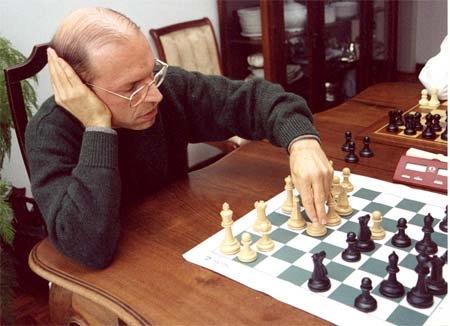## The Path to Immortality on the Board: Virtues of the Chess Grandmaster (by Tácito Loureiro)
Postado
18/12/2024 15H50

Chess, this silent dance of kings and pawns, is an art that transcends time, a science of calculation and beauty, and an arena where the human spirit finds its purest expression. Becoming a Chess Grandmaster is not merely a matter of titles or ratings, but a transformative journey that requires the cultivation of a set of intellectual, emotional, and spiritual virtues. It is a path that, when walked with dedication, elevates the chess player to a level of immortality on the board. May these words be an offering to dreamers who aspire to greatness. Let us explore:
### 1. Strategic Vision: The Gift of Seeing Beyond
The Grandmaster contemplates the board as a living organism in constant flux. While the ordinary player gets lost in the details of a piece or move, he observes the strategic horizon. Each move is part of a greater purpose; each action, a note in a symphony that echoes until the end of the game.
This strategic vision is the result of years of study and practice. The aspiring player must learn to interpret the board with an almost supernatural depth, anticipating not only the next moves but the underlying plans of the opponent. Study great games from history and ask yourself: what is the idea behind this move? What is the destiny of this position? Greatness lies in seeing not what is, but what can be.
### 2. Precise Calculation: The Mathematics of Art
If strategy is the horizon, calculation is the compass that guides each step. The Grandmaster is an architect of precision, capable of calculating variations with crystal clarity, exploring all possible branches of a move. Calculation is at the heart of tactical chess, where mistakes are punished with ruthless efficiency.
To develop this skill, the chess player needs to dedicate themselves to obsessive study of combinations, tactics, and critical positions. Train not only to calculate the longest sequence but to find the most efficient one. Learn to distinguish between what is necessary and what is superfluous in your calculations; as Capablanca said: "the good player always seeks the simplest and most efficient move." Calculation is the purity of logic in action.
### 3. Creativity: The Spark of Genius
Chess is not just a science; it is an art. The Grandmaster is a creator who finds beauty in chaos and order in the unexpected. He takes risks, innovates, and challenges conventions, writing his own poetry with the pieces. Ideas often misunderstood at the moment become immortal by lighting the way for future generations.
To cultivate creativity, the aspiring player must learn to step out of their comfort zone. Explore unknown openings, experiment with bold ideas, and embrace the risk of failure. Creativity in chess arises from a spirit that refuses to follow already trodden paths and seeks originality even in the most common positions. Remember: great artists on the board like Tal, Alekhine, and Kasparov did not fear making mistakes; they feared being predictable.
### 4. Mental Resilience: The Strength of Spirit
Chess is a battle of minds, and a weak mind will never achieve greatness. The Grandmaster needs unwavering mental resilience; pressure in high-level games is immense. He faces painful defeats and desperate positions but never gives up. He stands like a rock amidst the storm: firm, unshakeable, and confident.
To develop this resilience, learn to deal with failure. Each defeat is a lesson; each mistake an opportunity for growth. Cultivate patience and calm even in the most adverse situations. Remember Garry Kasparov's words: "Losing is part of the game; what matters is how you react to defeat." Mental strength is the shield of the Grandmaster.
### 5. Encyclopedic Memory: The Warehouse of Wisdom
The Grandmaster is an indefatigable scholar, a guardian of chess knowledge accumulated over centuries. His memory functions as a vast warehouse of ideas, patterns, and endgames; he recognizes patterns instantly, like a musician identifying a melody from its first notes.
To reach this level of memory, study incessantly: memorize opening fundamentals, classic endgames, and brilliant combinations. But remember: memory alone is not enough; it must be accompanied by a deep understanding of the game.
### 6. Psychology: Understanding Others
Although silent, chess is a psychological duel. The Grandmaster understands his opponent's mind as well as he understands his own. He identifies his opponent's strengths and weaknesses and exploits them skillfully.
To develop this skill, study not only chess but also people around you. Observe how your opponents react in different situations; learn to control your expressions during play. In chess—as in life—those who control their minds control the game.
### 7. Discipline: The Path to Excellence
The journey to becoming a Grandmaster is long and arduous; it requires almost monastic discipline and daily dedication to study and practice. There are no shortcuts to mastery; every hour invested is a brick in building greatness.
Cultivate a rigorous training routine: study classics, analyze your games, and play against stronger opponents. Be relentless in your pursuit of excellence; remember: a Grandmaster is not born; he is forged through continuous effort.
### 8. Humility: The Virtue of Wisdom
Finally, the Grandmaster is above all humble. He acknowledges that chess is infinite; there will always be something new to learn and even the greatest champions are fallible. Humility is the fertile ground where all other virtues flourish.
Accept your mistakes; recognize that there will be players better than you. Use this as motivation for continuous growth. As Emanuel Lasker said: "When you lose, do not lose the lesson." Humility is the beacon that guides the chess player in his relentless quest for wisdom.
## Conclusion: Journey to Eternity
Becoming a Chess Grandmaster goes beyond achieving a title; it involves profound inner transformation—a evolution of the human spirit. It encompasses cultivating strategic vision, precise calculation, vibrant creativity, robust mental resilience, sharp encyclopedic memory, keen psychological understanding, unwavering discipline, and constant humility.
At the end of this glorious journey, the Grandmaster does not merely dominate the board; he transcends the game itself, becoming a luminous example of human excellence. Games become immortal; ideas perpetuate through generations. May these virtues inspire today's chess players forever—may chess continue to reflect the greatness of human mind and spirit!
Categoria:Artigos




